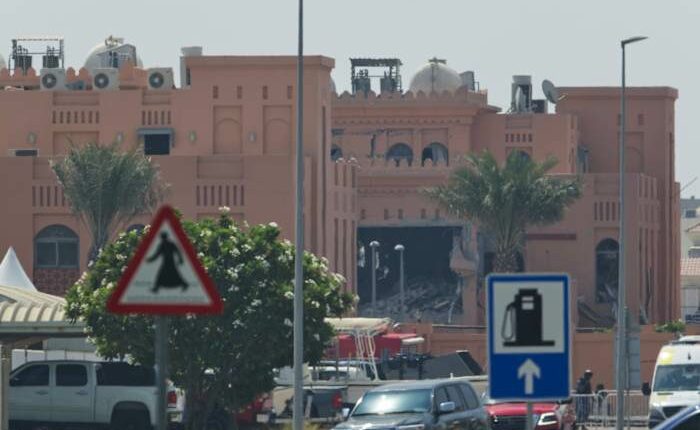Share this @internewscast.com

DUBAI – On Monday, Qatar took steps to organize a summit in response to Israel’s recent offensive against Hamas leaders in Doha. The meeting, involving Arab and Islamic nations, aims to explore strategies to contain Israel as its ongoing conflict with Hamas in the Gaza Strip continues.
The assault occurred while Qatar played a pivotal role as a mediator seeking to establish a ceasefire in the conflict, a role Doha has committed to maintaining despite the recent violence.
Following Hamas’ attack on Israel on October 7, 2023, Israel has launched retaliatory strikes against Hamas and other entities within Iran’s “Axis of Resistance.” These strikes have targeted regions including Iran, Lebanon, Palestinian territories, Syria, Qatar, and Yemen, inciting widespread anger among Middle Eastern countries already dismayed by the over 64,000 Palestinian casualties in Gaza. This situation raises doubts about the adequacy of U.S. security provisions in protecting Gulf Arab states.
“It is time for the international community to stop applying double standards and punish Israel for all the crimes it has committed,” expressed Qatar’s Prime Minister and Foreign Minister, Sheikh Mohammed bin Abdulrahman Al Thani, during a meeting on Sunday.
Nevertheless, the potential outcomes of the summit remain uncertain, as some nations with existing diplomatic relations with Israel might resist severing these ties.
The Soufan Center, based in New York, remarked, “Given the intense tensions between Gulf states and other regional players, organizing the summit within a week represents a significant accomplishment reflecting regional urgency.” The crucial question now is whether the summit will indicate a move towards more substantial actions against Israel, such as diplomatic downgrades, targeted economic sanctions, and limitations on airspace and accessibility.
Iran, which attacked Qatar in June, attending summit
Iran, which struck Al Udeid Air Base in Qatar after America bombed its nuclear sites in June during its war with Israel, sent President Masoud Pezeshkian to attend the meeting. Before leaving Tehran, Pezeshkian noted the wide breadth of nations Israel has attacked since Oct. 7.
“This regime has attacked many Islamic countries, including Qatar, Lebanon, Iraq, Iran and Yemen,” he said. “It does whatever it wants, and unfortunately, the United States and European countries also support these actions.”
Writing on the social platform X, Iranian Foreign Minister Abbas Araghchi added: “Iran stands with Qatar and indeed all Muslim brothers and sisters, particularly against the scourge that is terrorizing the region.” Araghchi and Pezeshkian did not mention Iran’s attack on Qatar.
Qatar has been key in Israel-Hamas war talks
Qatar, an energy-rich nation on the Arabian Peninsula that hosted the 2022 World Cup, long has served as an intermediary in conflicts. For years, it has hosted Hamas’ political leadership at the request of the U.S., providing a channel for Israel to negotiate with the militant group that has controlled Gaza for years.
But as the Israel-Hamas war has raged on, Qatar increasingly has been criticized by hard-liners within Netanyahu’s government. Netanyahu himself has vowed to strike all those who organized the Hamas-led attack on Israel in 2023, and in the time since the attack in Qatar, he has doubled down on saying Qatar remains a possible target if Hamas leaders are there.
On Sunday, U.S. President Donald Trump offered renewed support for Qatar.
“We’re with them. You know, they’ve been a great ally,” Trump said. “A lot of people don’t understand about Qatar. Qatar has been a great ally, and they also lead a very difficult life because they’re right in the middle of everything.”
U.S. Secretary of State Marco Rubio was in Israel on Monday for meetings with Netanyahu and other Israeli officials to express America’s concern over the attack on Qatar and talk about Israel’s planned new offensive on Gaza City.
Netanyahu faces increasing pressure from the Israeli public over the fate of the remaining hostages held in Gaza. There are still 48 hostages remaining in Gaza, of whom 20 are believed by Israel to still be alive. Israel’s offensives in Gaza has killed more than 64,000 Palestinians, according to local health officials, who do not say how many were civilians or combatants. It says around half of those killed were women and children.
The war in Gaza began when Hamas-led militants stormed into southern Israel on Oct. 7, 2023, killing around 1,200 people, mostly civilians, and abducting 251.
Copyright 2025 The Associated Press. All rights reserved. This material may not be published, broadcast, rewritten or redistributed without permission.











